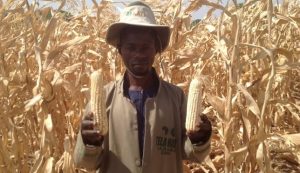Some stakeholders in the agricultural sector have commended the Federal Government on the release of new TELA maize varieties.

TELA Maize is the brand name for Genetically Modified (GM) maize hybrids developed by the TELA Maize Project.
The stakeholders, in separate interviews on Monday, January 15, 2024, in Abuja, applauded the initiative, saying it would boost food production in the country.
According to them, the new maize hybrids will also create more wealth for farmers.
Prof. Garba Sharubutu, the Executive Secretary, Agricultural Research Council of Nigeria (ARCN), said the approval of the TELA Maize variety in Nigeria was a welcome development in the use of biotechnology in ensuring food and nutrition security.
Sharubutu said it would also improve the livelihood of farming households in Nigeria and Africa.
On his part, Prof. Mustapha Abdullahi, Director-General, National Biotechnology Development Agency (NABDA), said with the advent of TELA Maize, farmers would help reduce the use of pesticides on maize to the barest minimum.
Dr Sylvester Oikeh, the TELA Maize Project Manager, celebrated the approval of the TELA Maize and urged other countries in Africa to embrace the new varieties for farmers.
“I am encouraged by this decision of the Federal Government of Nigeria; this shows its commitment to the needs of farmers,’’ he said.
The four varieties approved by the Federal Government are SAMMAZ 72T, SAMMAZ 73T, SAMMAZ 74T, and SAMMAZ 75T.
The new maize varieties are drought tolerant and resistant to stem-borer and fall armyworm resulting in yield advantage of up to 10 tonnes per hectare under good agronomic practices.
Partners in the TELA Maize project include National Agricultural Research Institutes in Kenya, Mozambique, Ethiopia, and South Africa,
Others are International Maize, and Wheat Improvement Centre (CIMMYT), Bayer, with funding from Bill and Melinda Gates Foundation and USAID.
By Bukola Adewumi
